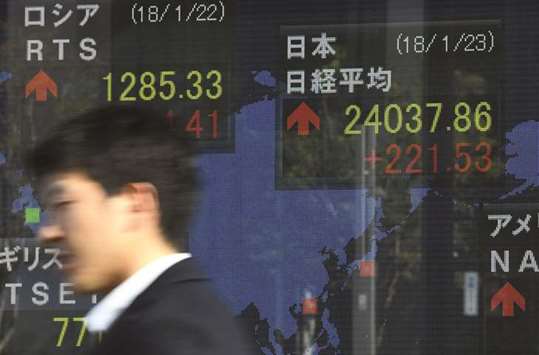Tokyo and Hong Kong led the surge in Asian markets yesterday as they extended a global new year advance on optimism about the upcoming earnings season.
While there were limited concerns about its likely economic impact, a deal in Washington that ended a US government shutdown also removed uncertainty and provided further support.
Democrats on Monday agreed to a Republican deal that brought an end to the three-day federal shutdown – the first since 2013.
The agreement, which keeps the government running until February 8, gave an extra nudge to Wall Street’s three main indexes, which all set new records by the end of trade.
But Stephen Innes, head of Asia-Pacific trading at OANDA, said the deal was “a matter of kicking the can down the road”. He added that given the partisanship in Congress, “we should expect another contentious affair if both parties don’t resolve the critical stumbling blocks between now and then”.
Still, equity markets remain upbeat, having surged in recent weeks on the back of a strong global economy, hopes for strong corporate profits and expectations of a positive hit from Donald Trump’s tax cuts. Sentiment was bolstered by a report from the International Monetary Fund raising its world growth outlook and predicting at least a short-term boost from the president’s fiscal policy.
Yesterday Hong Kong continued to hit new records, surging 1.7%, while Tokyo finished 1.3% up at a 26-year high of 24,124.15.
Shanghai soared 1.3% to 3,546.50 and Seoul jumped 1.4%. Sydney added 0.8% and Singapore was up 0.5%, while there were also healthy gains in Taipei, Jakarta and Kuala Lumpur.
The yen edged down against the dollar after the Bank of Japan offered no new guidance on its plans for monetary policy after earlier this month easing back on its bond-buying stimulus.
While no moves were expected from the central bank, there had been hopes the board would provide some forward guidance as it edges away from its easy-money crisis-era policies to move in line with the Federal Reserve.
“The decision makes it clear that the BoJ doesn’t want any noise about early tightening now,” Hiromichi Shirakawa, chief Japan economist at Credit Suisse Group AG and a former BoJ official, told Bloomberg News.
It “could have raised its growth forecast, given recent economic data, but it didn’t because it’s fearful of fuelling speculation of policy normalisation,” he said. “What they fear most is a strong yen.”
However, the dollar is struggling to bounce back against the euro as the European Central Bank considers its own tightening, while Germany is on course to end months of uncertainty and form a new government. Greg McKenna, chief market strategist at AxiTrader, said traders “believe not only that the other big central banks will follow the Fed higher with interest rates, but when the Fed stops others will still be
moving”.
Hopes for a “soft Brexit” sent the pound briefly above $1.40 for the first time since Britain voted to leave the EU in June 2016.
“That’s an implied economic lift for the UK economy and traders are acting as such,” McKenna added.

A pedestrian walks past an electronics stock indicator in the window of a securities company displaying the morning closing numbers at the Tokyo Stock Exchange. The Japanese shares finished 1.3% up to 24,124.15 points yesterday.
